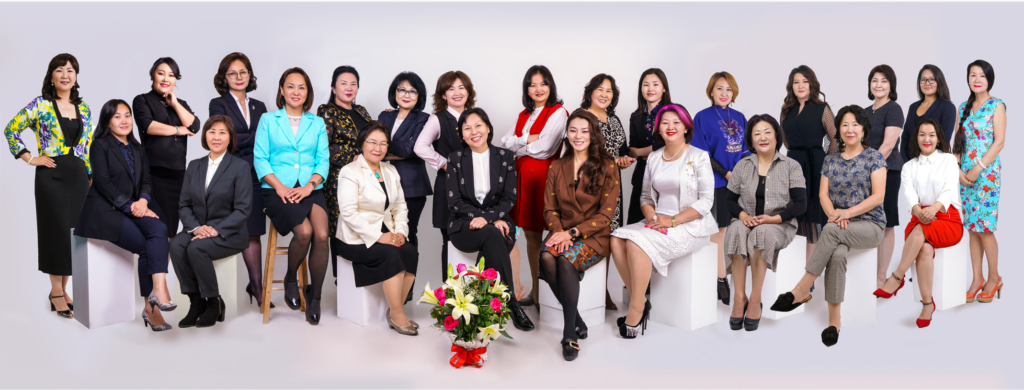We spoke with L. Bolormaa, A Board Member of Golomt Bank, Chairperson of Women Entrepreneurs Council at Mongolian National Chamber of Commerce and Industry about policies to support women in business and women leadership.
Can you please tell us about the turnaround management of Golomt Bank?
In December of 2013 I received an offer to lead the Golomt Bank’s turn-around and I was appointed as the Executive Vice President and Chief Investment Officer at Golomt Bank. I have led the efforts of expanding our operations in trade finance, investment banking and a newly established custodian bank. During my tenure we continually increased our funding from international banks and successfully established a partnership with more than 10 banks. Currently Golomt Bank is one of the leading banks in Mongolia in trade finance covering close to 43 percent of all trade finance transactions in Mongolia.
We have also invited IFC to provide us the advisory for the bank governance and as a result Golomt Bank has become one of the leading banks in Mongolia in corporate governance.
I have also served as a Chairperson of the Board of Golomt Capital LLC, led the efforts of Golomt Bank to acquire a majority shareholding in Mandal Insurance LLC and worked as a CEO of Golomt Financial Group LLC.
I left my position at Golomt Financial Group to pursue my passion of assisting SMEs and start-ups in Mongolia helping them with funding, strategy and management advisory. One of my latest projects is a start-up accelerator company, Kite Mongolia LLC, which organized “Social Innovation Week 2021” event this February. The event was supported by ADB Ventures, a new investment fund that invests in early technology companies in Asia.
I feel honored to represent women leadership in private sector and in social innovation in Mongolia.
Can you tell us more about your banking career?
When Mongolia was transitioning to a two-tier banking system, I joined one of the first commercial banks in Mongolia and in three years I was promoted to the Head of the Foreign Exchange Department and Deputy Head of the International Division. Many of current large corporations in Mongolia have started their business with our bank.
I completed my master’s degree in international economics in the United States in 1998 and a MBA degree in Japan in 2000. My long time dream has been to work for large international banks and to bring back the knowledge I would acquire from working in developed financial markets. I received job offers from Deutsche Bank, Chase and Merrill Lynch and joined Deutsche Bank in Tokyo to become their first Mongolian employee. When I look back I could certainly said that I have a wonderful career serving as the First Deputy CEO of the Development Bank of Mongolia, leading the Golomt Bank’s turn-around and creating the first social innovation fund to support start-ups in Mongolia.
How did you manage your personal life while pursuing your career goals?
Now that my kids have grown up and I do not have many grandchildren, I am enjoying my time to solely focus on my work. When my kids were small I used to get up early and the only time left for me often would be nights. It is important for working parents to spend quality time with their kids and to provide them with a fertile environment to satisfy their interests and curiosity and to assist them in expanding their minds. For instance, I used to take my kids to every museum, gallery and theatre when we lived in New York and Tokyo, discuss movies, explore different cultures. The more you provide your children with opportunities to learn to discover new things, the more you are contributing to the development of your children’s minds. It is very important that you read to your kids, surround them with books, let them paint and draw and answer to all their curious questions, particularly when their young. Therefore, as a working mother you learn to manage your time more efficiently by becoming more organized, reducing redundant tasks through “automation” and creating routines that help you to manage your life-work balance.
All around the world, the media is celebrating female leaders who performed exceptionally well during the COVID-19 pandemic. Can you please tell us how different women leadership from men leadership?
Women leaders are good at calculating risks, working in teams and finding collective solutions. They are also better in planning and following it up with detailed execution. They are also more compassionate leaders. I believe this is why female leaders are performing better during the pandemic. I am thankful that the COVID-19 crisis has helped to put a shine on women leadership. I hope that Mongolia will have more female politicians like the Prime Minister of New Zealand, Jacinda Ardern and German Chancellor, Angela Merkel.

You are the Chairperson of the Women Entrepreneurs Council at the Mongolian National Chamber of Commerce. What are you working on to improve the business environment for women in Mongolia?
Around eight years ago, I was elected as the Chairperson of the Women Entrepreneurs Council. What I noticed is that women successfully operated their businesses but that are not very good in addressing a range of obstacles that they encounter in running their businesses. We need to improve our business environment, which starts with laws, regulations and policy support for businesses. The Women Entrepreneurs Council at the MNCCI has been quite successful in addressing these issues by providing written comments, suggestions to the laws and regulations and by cooperating with industry associations in bringing our voices.
The Women Entrepreneurs Council at MNCCI has built a strong reputation in bringing private sector voices into policy making and our policy advocacy is considered as one of the strongest. For instance, almost 80 percent of the proposals submitted by our council were reflected in the amendments to the tax legislations. Today, every business is enjoying the benefits of these amendments. In terms of the Law of Mongolia on Support of Small and Medium Enterprises and Services, as our council suggested removal of unrealistic provisions such as government agencies providing business management advice to the private sector. However, despite our efforts, the definition of what constitutes a women-owned business and the new provisions on governance of the SME fund were not incorporated in the revised laws.
What do female entrepreneurs expect the most from our decision-makers?
First of all, we need a corruption-free society in order to improve and enhance the business environment in Mongolia. In addition, we can ensure gender equality in business only by including the definition of a women-owned business in the Company Law of Mongolia. Over 46 countries around the world have done so by incorporating a women-owned business definition into their laws, policies and development strategies. It will enable further support to female entrepreneurs through targeted public policies and programs and it will ensure women’s participation in public procurements. For women in business, the Labour Law, the Law of Mongolia on Support of Small and Medium Enterprises and Services and the tax legislations have been the most relevant laws in improving the business environment. We have made several suggestions to the Labour Law and it is very important to include our proposals in upcoming changes into the Labour Law. After all, women in business create most sustainable jobs in Mongolia.
Due to gender inequality, countries, households and citizens fail to fully exploit their resources. Would you agree with this statement?
Absolutely agree! In 2007, Mongolia agreed to achieve the Sustainable Development Goals set by the United Nations. The goals address all issues concerning social development. Gender equality is not restricted to ensuring equality between men and women but also includes people with disabilities and LGBTs. As men and women will continue to encounter different obstacles in starting and running their businesses we will continue talking about gender inequality in the business sector.
In Mongolia, women’s employment has been decreasing each year and at the moment, only 46 percent of women work. According to a study conducted by the Asia Development Bank, if all women started working, the GDP of Mongolia would grow by 0.5 percent each year. If you carefully look at the employment statistics, approximately 1.2 million people registered as working but one in three runs household businesses. Household businesses in Mongolia are created primarily out of necessity because there are not enough jobs in the market. Furthermore, around 20 percent have temporary seasonal jobs in the construction and mining sectors. This means that close to half of the employed people are vulnerable and they can easily slid into poverty in situations like COVID-19.
In Mongolia, the average age of the population is 27.5. By 2045 it is estimated that the population will reach five million with over 60 percent of the population in working age group and the average age of the population will remain at 27.5. How can we ensure for them an employment in the future? I believe more jobs can be created if the government carries out comprehensive and effective policies to support domestic production in non-mining sectors, encourage innovation and new industries such as IT services and prioritize private sector development. The Government of Mongolia could take various economic measures such as setting differing rates on customs duty for imported products and raw materials, reduce value-added tax for domestic manufacturers or offering tax credits to small and medium enterprises that are creating long-term sustainable jobs.
I believe by developing our information technology sector, we could create high-paying jobs for unemployed youth. We need to start discussing how we can close the gap in understanding between the Government and the private sector on what are the priorities in improving the business environment and how we could cooperate to accelerate the development of our country. Mongolia has everything including smart youth, creative private sector and natural resources. We only need a smarter public leadership engaged in productive dialog with the private sector. This has been a key for success for many developed countries and it should be for Mongolia as well.
Source: “Mongolian Economy” magazine
